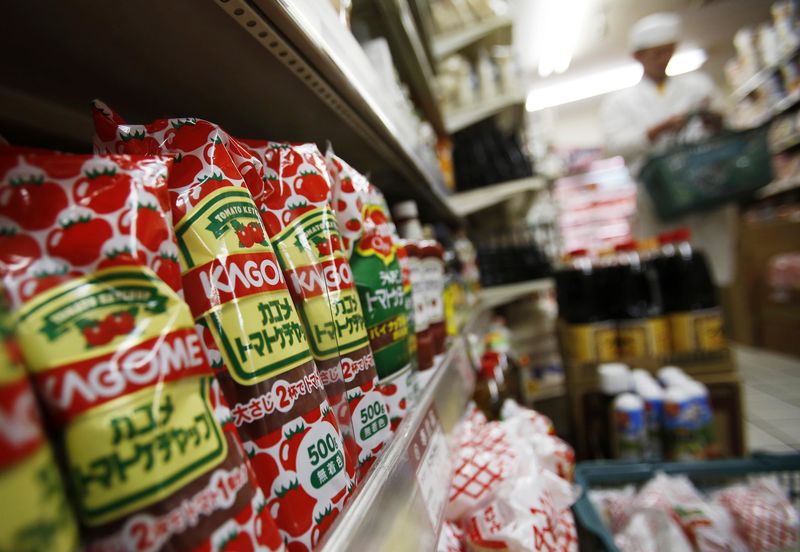By Mari Saito
TOKYO (Reuters) - For Tokyo-based condiments maker Kagome <2811.T>, and perhaps for Japan's government, the challenge of breaking with a decade and a half of deflation boils down to the price of a bottle of ketchup.
Japan's most popular ketchup brand is hiking prices for the first time in 25 years in April, the kind of inflation that Prime Minister Shinzo Abe's economic policies are aimed at encouraging.
But Kagome, like most companies, fears that consumers are not ready to pay more.
"When you're managing your daily grocery spending, it's an accumulation of small expenditures. And as you make small purchases, you notice that prices are slowly rising, and consumers get worried," said Fumitaka Ono, a manager in Kagome's product development department.
Prices on ordinary items from toilet paper to frozen meals have been rising as companies take steps to offset the weaker yen in recent weeks. That has put pressure on household spending and consumer confidence less than a year after a sales tax hike sent the economy into recession.
Stagnant wages and public concern about the future compound the problems facing Bank of Japan Governor Haruhiko Kuroda, nearly two years after a pledge to push inflation to 2 percent through a massive asset purchase programme.
Opposition party members have questioned the effectiveness of that target and Kuroda's attempt to smash what he has called Japan's "deflationary mindset", a recession-era habit where saving money became a reflexive response to declining prices.
Economic theory predicts that consumers spend more in an inflationary environment, but that deflationary mindset can act as a brake.
"When they expect more inflation, people spend less, not more, because they expect prices to go up, but they don't expect their incomes to go up as much," said Richard Katz, the editor of the Oriental Economist, a Japanese economics newsletter. "That's exactly what's happened under Kuroda-nomics."
A Bank of Japan survey published in January found only 7 percent of people believed the economy would be better a year from now. In December, Japan's famously high savings rate turned negative for the first time, suggesting people were starting to dip into their reserves to keep up with rising living costs.
Tomomi Akiyama, a financial planner in the suburbs of Tokyo, says she has seen a rush of new clients since last autumn, especially suburban mothers.
"There is a sense of real uncertainty and worry, especially among my clients in their 20s and 30s," said Akiyama. "A lot of people also come to me because they are worried that their family income will not rise much in the future, and they want me to help them prepare for that."
TOMATO PRICE SURGE
Kagome representatives say the 116-year-old company moved to hike prices after months of internal debate, reluctantly concluding that cost cuts alone could not offset the rapid decline in the yen and the 40 percent surge in tomato paste prices over two years. It will raise ketchup and sauce prices by up to 13 percent.
Rival Kikkoman Corp (T:2801) is also raising prices of tomato-related products by up to 10 percent.
Such announcements have caused a stir, prompting one tabloid to run a calendar of looming price hikes so shoppers can stockpile.
In December, Japan's core inflation, which excludes fresh food but includes oil, stood at 0.5 percent, a quarter of the central bank's inflation target. Food products, excluding fresh food, rose 3.3 percent in 2014, including the sales tax impact.
To win over shoppers, Kagome has introduced a low-sodium ketchup plus marketing tricks such as special bottle caps so children can draw pictures in sauce on their food, and a cooking competition for the best "omrice", an omelette served over rice eaten with lashings of ketchup.
But a typical Japanese family buys just two or three bottles of ketchup a year, a number that has not budged in five years. Kagome is counting on a rush to stock up before the price hike, but it expects a sales slump to follow.
"We can no longer say we are safe just because we have a strong brand," Ono said.
